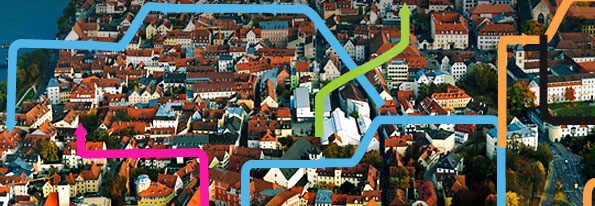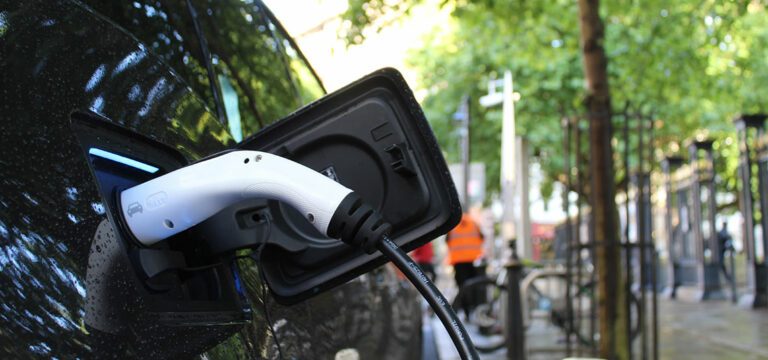
Startseite > Mobility
Mobility
Mobility solutions that will still have an impact in the generations to come require courage and must overcome some resistance. The Wright brothers’ attempts at flight, the construction of cathedral-like train stations that are still functional today, or Bertha Benz’s famous first tour in a motorized carriage are good examples. But even today, mobility innovations are not always easy, as the case of the failed streetcar in Wiesbaden shows.
Technical change and growing demands due to a lack of resources or climate targets are once again calling for sustainable mobility solutions. This is a challenge for the automotive and supplier industries, public transport providers, transport planners and infrastructure decision-makers alike.
Viable visions not only take into account what is technically feasible, but also focus on people as users. The social science-based infas mobility research measures and analyzes advantages and acceptance, but also obstacles and barriers of innovative mobility solutions. Damit helfen wir, zukunftsfähige Neuerungen und Weiterentwicklungen so auszugestalten, dass sie auch den Praxistest bestehen.
To this end, we conduct research on current topics such as multimodality, electromobility, automated driving or car sharing. We conduct nationwide baseline studies on mobility, most recently in Germany, Austria and Luxembourg. For public transport, we regularly measure passenger satisfaction and empirically test new fare options and digitization strategies.
Mobilität in Deutschland
The study “Mobility in Germany” (MiD) is commissioned by the Federal Ministry of Digital Affairs and Transport (BMDV, then BMVI). Building on the earlier KONTIV surveys conducted by infas, the study was first conducted in 2002 and repeated in 2008 and 2017.
The MiD 2017 was organized and conducted by infas in cooperation with a team of other providers. A total of 135,000 households were surveyed. The results of the MiD 2017 can be found here.
Mobility studies
With the studies “Mobilität in Deutschland”, “Österreich unterwegs” and “luxmobil”, infas has implemented three leading studies on nationwide mobility. The surveys commissioned by the governments in Germany, Austria and Luxembourg provide detailed data on the mobility behavior of the population and thus serve as a basis for political decisions.
The study “Mobilität in Deutschland” (MiD) is commissioned by the Federal Ministry of Digital Affairs and Transport (BMDV, then BMVI). It was first conducted in 2002, building on the earlier KONTIV surveys by infas, and was repeated in 2008 and 2017. Currently, the next survey of mobility in Germany (MiD 2023) is being prepared.
The MiD 2017 was organized and conducted by infas in cooperation with a team of other providers. A total of 135,000 households were surveyed. The results of the MiD 2017 can be found here.
The study “Österreich unterwegs” is the equivalent of the MiD in Austria and was processed in 2014/2015 by infas together with TRICONSULT Wirtschaftsanalytische Forschung Gesellschaft m.b.H.. This mobility survey was commissioned by the Federal Ministry of Transport, Innovation and Technology (bmvit) in Vienna together with the Austrian provinces, ASFiNAG and ÖBB. Around 17,000 households were surveyed for the study.
For Luxembourg, infas conducted the study “luxmobil”, for which 40,000 Luxembourgers and 45,000 cross-border commuters from France, Belgium and Germany were contacted. The survey was commissioned by the Département des transports in the Ministère du Développement durable et des Infrastructures, Luxembourg.
All mobility studies are based on a complex combination of written, telephone and online surveys in which, on the one hand, basic data and, on the other hand, mobility behavior are queried on a given reference date. The result is a reliable picture of transportation use and motives and attitudes toward mobility in the country. The studies also provide a comprehensive database for regional planning and marketing of transport services and for projections of traffic patterns.
Public transport
Local public transport plays an important role in achieving climate targets and ensuring future mobility in metropolitan areas and rural regions alike. At the same time, public transport faces strong competition from private transport and new mobility services. The Corona pandemic presented public transport services with a major challenge. Demand dropped significantly as many passengers were afraid of infections on buses and trains. A turnaround was initiated by the 9-euro ticket, which brought back many passengers, but also attracted new ones. infas continuously monitors developments in public transport through the MOBICOR project, thus closing the time gaps that occur between the surveys of the comprehensive MiD surveys.
infas has a comprehensive set of methods at its disposal to address specific issues for transport companies. We determine the connection between customer perception and company success and, if desired, put all aspects of the customer relationship to the test. Our market research tools enable detailed analyses of public transport services and the derivation of recommendations for action to align services with customer needs. Public transport market research includes:
- Studies on inter- and multimodality and the perspective role of public transport;
- Quality management: Standardized or individualized passenger satisfaction research. We offer a measurement of customer satisfaction and loyalty specifically tailored to the respective regional situation (also within the framework of DIN EN 13816 and DIN EN 15140);
- Qualitative research to inventory customer touch points through specially designed observation procedures;
- Market potential analyses of transport offers, taking into account alternatives, price structures and user preferences;
- Acceptance analyses for the introduction or review of tariff variants;
- Analyses of incident management, for example by means of a logbook protocol, in particular taking into account VO 1371/2007 EC;
- Studies on new customer entry into public transport with a focus on distribution and tariff aspects;
- Reviews of information practices in operations, with a particular focus on digitization;
- Studies to test communication measures in public transport; target group analyses for optimal addressing, impact measurements and concept tests of advertising approaches or information systems (also taking into account VO 1371/2007 EC).
Through its sister company infas 360 GmbH, infas has access to a comprehensive stock of market and geodata. For infas studies in public transport market research, survey data is combined with geodata, but also with customer data, if required for overarching analyses. This procedure enables microgeographic evaluations of the spatial distribution of customers.
New methods for traffic measurement
Mobility and transport are in a constant state of change. In order to describe these changes with figures, the small-scale collection of mobility and traffic data is necessary. infas is researching new solutions to meet these challenges with innovative approaches and is using these specifically in projects. The smartphone takes center stage. For this purpose, infas uses the mobico app, which automatically and passively measures mobility behavior.
The smartphone has become our constant everyday companion. Many everyday activities can hardly be done without the smartphone, which is why we (almost) always carry it with us. This, and the wide range of sensors it has, makes it an ideal survey instrument. With the mobico app, infas wants to make smartphones usable for traffic and mobility research and establish them as an innovative instrument in the repertoire of methods. The mobico app has been implemented for the iOS and Android operating systems and is available for download in the corresponding stores.
Use in infas projects
As early as 2015, infas carried out its first projects in the field of smartphone tracking for traffic research. Important experience has already been gained in the “multimo” project. It has been shown that the use of apps enables the automated recording of routes and stays via the smartphones of the study participants without their active involvement. Since then, the system has been further developed and extensively tested. It is now one of the most powerful systems and can be used for comprehensive surveys with high quality requirements.
Since the launch of the Austrian KlimaTicket at the end of 2021, infas has been conducting accompanying research there. This project will run until 2026 and infas is using its own app for passive trip measurement here.
Due to the passive approach, in which all important mobility data is collected by the app in the background, the survey effort for the test persons is extremely low and long survey periods can also be realized. This allows differentiated insights into mobility behavior and the description of changes over a longer period of time. Using this approach, the MOBICOR project was able to consistently observe changes in mobility behavior during the Covid 19 pandemic. It was possible to show the extent to which public transportation was avoided and the extent to which the lockdown contributed to what times people traveled and how much bicycling was actually done. The results of the study were regularly documented in reports and are available for download.
Measuring mobility with the smartphone
Measuring mobility and traffic with a smartphone is a complex technical challenge, since the sensor data collected is used to infer the means of transport used. Various algorithms are used for this purpose. For this purpose, infas cooperates with MOTIONTAG, which contributes its many years of experience in the field of automated means of transport recognition.
The algorithm can currently distinguish 10 means of transport. Each mode of transport use is represented as a single stage. Information on time of day, duration, length, speed and progression is available for each recorded stage. Stops are also identified and can be enriched with further spatial information.
The advantages of the passive and digital approach
An essential quality of the passive approach of the tracking app is the possibility to realize long survey periods, since the survey effort of the participants is very low. In addition, the accuracy of the individual path parameters is very high and objective, since the information is not estimated or rounded from memory. Also, no paths are forgotten. Due to the continuous improvement of the technical system, battery consumption no longer plays a significant role and is negligible. This can further increase the acceptance of use.
Due to standardized data formats and on the basis of script-based evaluations, survey results can be provided promptly after completion of the field phase. At the same time, survey costs can be reduced compared to analog route diaries.
Combination with other survey approaches
Currently, no personal information is collected via the app, so there is a lack of data on sociodemographics and also on the means of transport. It is therefore possible to combine the app survey with other methods, such as online surveys. This allows additional relevant information to be added to a data set that can be used for a variety of purposes. In addition to traffic surveys, planning projects, success measurements or evaluations of measures can also be realized in high quality.










